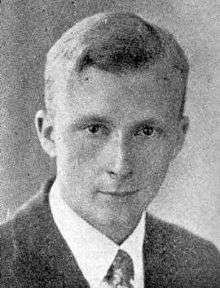Cecil Purdy
Cecil John Seddon Purdy AM (27 March 1906[1] – 6 November 1979), often referred to as "C. J. S. Purdy", was an Australian chess player and writer. He was awarded the titles International Master in 1951 and Grandmaster of correspondence chess in 1959. Purdy was the inaugural world correspondence chess champion. He was also an influential chess magazine writer, editor, and publisher.
| Cecil Purdy | |
|---|---|
 | |
| Full name | Cecil John Seddon Purdy |
| Country | Australia |
| Born | 27 March 1906 Port Said, Egypt |
| Died | 6 November 1979 (aged 73) Sydney, Australia |
| Title | International Master (1951) ICCF Grandmaster (1959) |
| ICCF World Champion | 1950–53 |
Life
Purdy was born in Port Said, Egypt, where his father John Smith Purdy was stationed as a doctor in the Quarantine Service.[2]When he was a child, Purdy moved with his family to New Zealand, and then to Tasmania, Australia, before they settled in Sydney when he was 12, where he was educated at Cranbrook School. While in Tasmania, one of his classmates was future film star Errol Flynn.[3]
He began his chess career at the age of 16, and he soon decided to become a full-time chess writer and player. Initially an over-the-board (OTB) player, he soon began to mix OTB play with correspondence play. He was a four-time winner of the Australian Chess Championship, in 1935, 1937, 1949, and 1951. He won the first two Australian Correspondence Chess Championships, in 1938 and 1945. He also won the New Zealand Chess Championship in 1924/25. In Auckland of 1952, Purdy drew a hard-fought match with Ortvin Sarapu, at the time by far the best player in New Zealand. They were thus declared Australasian co-champions.[4]
He was married in 1934 to Anne Crakanthorp (1915–2013), the daughter of two-time Australian Chess Champion Spencer Crakanthorp. The marriage produced two children, John (1935–2011) and Diana. John Purdy followed in his father's (and grandfather's) footsteps in winning the Australian Chess Championship in 1955 and 1963. Diana was also a keen chess player, and she married leading New Zealand player Frank Hutchings in 1960.
Purdy founded and edited the magazine Australasian Chess Review (1929–1944); this became Check (1944–45), and finally Chessworld (1946–1967). He was described by Bobby Fischer as being a great chess instructor. Some of his writings are still in print. A famous remark of his is "Pawn endings are to chess what putting is to golf." [5]
In 1976 he was awarded the Order of Australia for services to chess.[6]
Death
Purdy died from an aneurysm while playing chess over the board.
Published works
- Purdy, C.J.S. (2003). C.J.S. Purdy on the Endgame. Thinker's Press. ISBN 1-888710-03-9.
- Purdy, C.J.S. (1972). How Fischer Won: World Chess championship, 1972. E. J. Dwyer. ISBN 978-0855742089.
- Purdy, C.J.S. (1950). Guide To Good Chess. Horwitz.
References
- The Times, 26 May 1906, p.1 - As Edward Winter has demonstrated in his article on Purdy, his year of birth was incorrectly given as 1907 in several issues of his magazine Chess World and editions of his Guide to Good Chess, as well as in chess reference books up to the time of his death. The (London) Times (Births announcements) of 26 May 1906, p.1 reports—"PURDY - On the 27th March, 1906, at Port Said, to Emily and J.S. Purdy M.D., F.R.G.S., Surg.-Capt. New Zealand Militia, a son (Cecil John Seddon)"
- John Smith Purdy, Australian Dictionary of Biography, 1988
- "C.J.S. Purdy" by Edward Winter
- Sarapu–Purdy Australasian Championship Match, chessgames.com.
-
- Purdy, C.J.S. (1950). Guide to Good Chess. p. 71.
- "Member of the Order of Australia (AM) entry for Mr Cecil John Seddon PURDY". It's an Honour, Australian Honours Database. Canberra, Australia: Department of the Prime Minister and Cabinet. 26 January 1976. Retrieved 21 April 2019.
AM (CIVIL DIVISION) AUST DAY 1976
- Dunne, Alex (1991). The Complete Guide to Correspondence Chess. Thinker's Press. ISBN 0-938650-52-1.
Further reading
- J. Hammond and R Jamieson, C.J.S. Purdy: His Life, His Games and His Writings, Belmont Printing Co. Melbourne 1982
- C.J.S.Purdy, Frank Hutchings and Kevin Harrison, How Purdy Won: The Correspondence Chess Career of a World Champion, Castle Books 1983, ISBN 0-7255-1439-6
External links
- Cecil John Seddon Purdy chess games at 365Chess.com
- Cecil Purdy player profile and games at Chessgames.com
- Purdy, Cecil John Seddon (1906 - 1979), Australian Dictionary of Biography - Online Edition
- "C.J.S. Purdy" by Edward Winter
| Preceded by none |
World Correspondence Chess Champion 1950–1953 |
Succeeded by Viacheslav Ragozin |